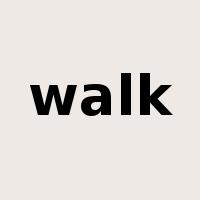
单词 walk
标签 中考 高考 四级 六级 考研
释义
v. 走,步行;徒步旅行,散步;陪(某人)走,护送(某人);带(宠物)散步,遛;把(某物)移走,使(某物)移动;<非正式>消失,被偷;轻易做成(某事);<非正式>放弃,突然退出;出现,显灵;(使)上一垒;被无罪释放,未获刑罚;(击球手不等裁判指示)离开球场;<古>生活
n. 步行,散步;徒步旅行;散步的小路,步行的路径;步态;步行的距离(或时间);步行速度;(棒球)自由上垒;<英>(护林人的)管辖林区;斗鸡场;<英>小猎犬驯养场;<英>(邮递员的)投递路线;<罕>一群沙锥
【名】 (Walk)(美)沃克(人名)
变形 复数 walks 第三人称单数 walks 现在分词 walking 过去式 walked 过去分词 walked
时间: 2024-11-30 18:08:11
walk 考试频率
中考
考频:近四年出现370次
v/n. 走; 步行; 散步
v. 遛狗
高考
考频:近六年出现46次
v/cn. 走; 步行; 散步
v. 走过; 沿…走
四级
考频:近五年出现16次
v/n. 步行; 散步
六级
考频:近五年出现10次
v/n. 步行; 散步
考研
考频:近六年出现8次
v/n. 走; 步行; 散步
n. 人行道; 小径
walk 常考辨析(核心内容对比分析)
walk/pace/plod/stagger/stride/toddle/totter.导航词义:行走
1. walk:v. 走,步行.指行走的最普通用词,通常后接副词或介词。
Shall we ride or walk?
我们骑马还是步行?
She walked as far as the end of the path.
她一直走到这条小路的尽头。
The boy told me that I should walk eastward.
那个男孩告诉我应该往东走。
2. pace:v. 踱步,走动.尤指因紧张、担忧、不耐烦等而来回踱步。
I found him pacing in his office.
我发现他在办公室里踱来踱去。
The manager paced the floor as he tried to find a solution to the problem.
经理在屋子里来回踱步,试图找出解决问题的办法。
The tiger paced in its cage.
老虎在笼子里走来走去。
3. plod:v. 沉重缓慢地走.指脚步缓慢、步履艰难地行走。
The poor old woman plodded along, hardly able to lift each foot.
可怜的老妇人吃力地走着,几乎都抬不动脚了。
John kept plodding on.
约翰继续艰难跋涉。
We had to plod wearily on up the hill.
我们不得不迈着疲倦的步子继续登山。
4. stagger:v. 蹒跚,摇摇晃晃地走.通常指因虚弱、负重、醉酒等而导致身体失去平衡或行走失态,强调不稳定性和失控性。
He staggered to the gate, bleeding from his wounds.
他蹒跚地向大门走去,伤口流着血。
The drunken man staggered home.
那个醉鬼摇摇晃晃地往家走去。
He staggered to his feet.
他摇摇晃晃地站起来。
5. stride:v. 大踏步走.强调步子大而有力,往往伴有或显露出匆忙、自傲、精力充沛等状态。
She turned and strode off.
她转身迈着大步走了。
He strode towards his car.
他大踏步地向他的车走去。
He started back, striding swiftly.
他拔腿往回走,步子又大又快。
6. toddle:v. 蹒跚行走.特指幼儿因学步而摇摇晃晃地小步行走。
Her baby has just learned to toddle.
她的宝宝刚会走道儿。
My two-year-old son toddled into the bedroom.
我两岁的儿子摇摇摆摆地走进卧室。
7. totter:v. 踉跄,蹒跚.指尤因醉酒或患病而摇摇晃晃、跌跌撞撞地行走,好像要跌倒似的。
The old man managed to totter back to his seat.
那位老人摇摇晃晃地好不容易回到了座位上。
Babies and aged men totter as they walk.
幼儿和老人走路蹒跚。
With the help of two crutches, he tottered into the King's presence.
他拄着双拐蹒跚而行,来到国王的面前。
walk 考点用法
【不及物动词】意为走,步行,与介词组成固定搭配
He walked to the end.
他走到了终点。[2018年 · 高考 · 北京卷 · 阅读]
He liked it so much that he quickly walked into the shop.
他非常喜欢它,所以他很快走进了商店。[2015年 · 高考 · 全国卷II · 改错]
As darkness came over the field and the match ended, the goal keeper, Juan, walked over to me.
夜幕降临,比赛结束,守门员胡安向我走来。[2020年 · 高考 · 江苏卷 · 阅读理解]
Last week she walked up to the store.
上周她去了商店。[2021年 · 高考 · 浙江卷 · 完形填空]
walking around the cabin (客舱) can be of help.
在客舱周围走走会有所帮助。[2015年 · 高考 · 重庆卷 · 完形填空]
I walked across the stage at high school graduation.
我走过高中毕业典礼的舞台。[2021年 · 高考 · 浙江卷 · 读后续写]
He refused to discuss it and just walked off.
他拒绝讨论这件事,只是走开了。[经典例句]
【可数名词】意为走,步行; 散步
He had a walk.
他散了步。[2021年 · 高考 · 浙江卷 · 听力]
Let's go for a nice walk into the country this afternoon.
今天下午我们去乡下散散步吧。[2017年 · 高考 · 全国卷II · 听力]
There are two parks less than 10 minutes' walk from home where neighbourhood children gather to play.
从家里步行不到10分钟就有两个公园,附近的孩子们聚集在那里玩耍。[2021年 · 高考 · 浙江卷 · 阅读理解]
【及物动词】意为步行,直接加表示距离的名词
We sleep in a tent, cooked over an open fire, and walked a long distance to take the shower.
我们睡在帐篷里,在篝火上做饭,然后走很远的路去洗澡。[2017年 · 高考 · 全国卷I · 阅读理解]
【及物动词】意为步行送,后常接人名
Sam walked her to a nearby convenience store so that she could safely wait for the police to take her home.
萨姆陪她去了附近的便利店,这样她就可以安全地等警察带她回家了。[2021年 · 高考 · 北京卷 · 语法填空]
walk 双语例句
全部
1·I recognized him by his walk.
我根据他走路的样子认出了他。《牛津词典》
2·I walk to work most mornings.
我大多数早晨步行去上班。《牛津词典》
3·I'm not sure I can walk so far.
我没有把握能步行这么远。《牛津词典》
4·She's taken the dog for a walk.
她带着狗去散步了。《牛津词典》
5·They walk their dogs every day.
他们每天遛狗。《牛津词典》
6·She slowed to a steady walk.
她慢下来,稳步行走。《柯林斯英汉双解大词典》
7·Shall we walk or go by bus ?
我们步行呢,还是坐公共汽车?《牛津词典》
8·Even a short walk exhausted her.
即使走一段短路,她也疲惫不堪。《牛津词典》
9·Shall we walk a little way?
我们走一小段路好吗?《牛津词典》
10·He set out on the long walk home.
他动身走很长的路回家了。《牛津词典》
走
1·I began to walk slower and slower.
我开始走得越来越慢。《柯林斯英汉双解大词典》
2·Shall we walk a little way?
我们走一小段路好吗?《牛津词典》
3·I'm going your way—I'll walk with you.
咱们同路,我和你一起走。《牛津词典》
4·In the last resort we can always walk home.
顶多我们走回家就是了。《牛津词典》
5·It's not safe to walk the streets at night.
夜间在街上走不安全。《牛津词典》
走路
1·I recognized him by his walk.
我根据他走路的样子认出了他。《牛津词典》
2·The baby is just learning to walk.
这孩子刚学走路。《牛津词典》
3·I can walk without the aid of crutches.
我能够不借助拐杖走路。《柯林斯英汉双解大词典》
4·My prayer is that one day he will walk again.
我的企盼就是有一天他能重新走路。《牛津词典》
5·The 16-pound feline is so fat she can hardly walk.
这只16磅重的猫因太胖而几乎无法走路。《柯林斯英汉双解大词典》
步行
1·Shall we walk or go by bus ?
我们步行呢,还是坐公共汽车?《牛津词典》
2·'I'd prefer to walk,' she answered.
“我宁愿步行。”她答道。《牛津词典》
3·I'm not sure I can walk so far.
我没有把握能步行这么远。《牛津词典》
4·It's only a short walk to the beach.
步行到海滩没多远。《牛津词典》
5·I walk to work most mornings.
我大多数早晨步行去上班。《牛津词典》
行走
1·She slowed to a steady walk.
她慢下来,稳步行走。《柯林斯英汉双解大词典》
2·Is it safe to walk the streets alone at night?
夜间独自一人在大街上行走安全吗?《牛津词典》
3·The child was not able to speak, walk properly or control bodily functions.
这个孩子不能说话,不能正常行走或控制大小便。《柯林斯英汉双解大词典》
4·Some spiders can walk on water.
有些蜘蛛能在水上行走。
5·Arms help people walk.
胳膊帮助人们行走。
散步
1·We would often have a walk of an evening.
我们过去常在晚上散步。《牛津词典》
2·A brisk walk should blow the cobwebs away.
轻快的散步可以使人头脑清醒。《牛津词典》
3·They felt refreshed and invigorated after the walk.
散步之后他们感到精神焕发。《牛津词典》
4·Taking a brisk walk can often induce a feeling of well-being.
轻快的散步经常能使人心旷神怡。《柯林斯英汉双解大词典》
5·If you enjoy the coast and the country, you'll get the best of both worlds on this walk.
你要是喜欢海滨和乡村,那么这次散步你会一举两得。《牛津词典》
走过
1·Some people think it's unlucky to walk under a ladder.
有些人认为从梯子下面走过不吉利。《牛津词典》
2·The little hero only hope to arrive early rub, he turned and 13 at window, the darkness is, this is a never walk the road, as there is no house, is the wasteland.
小杰只希望能够早点到搓路13号,他转头看着车窗外,路边是一片漆黑,这是一条从来没有走过的路,好象没有房屋,是片荒地。
3·Seal it up. Don't give people a sense that they can imitate the experience and walk in the steps of the people who were there.
把它封存起来。不要给人一种感觉他们能够模仿这里的经验和重蹈这里的人曾经走过的路。
4·So, off I went to the back of the store to use the courtesy phone near the customer service desk.I called and spoke with a very friendly woman, and she was happy to walk me through the process.
所以,我去了商店的后面仓库用客户服务桌旁的免费电话打了个电话,是一位非常友好的女士接的电话,她很热心的带我走过整个过程。
5·In fact, were you to actually consume all the food and drink on this itinerary, you'd feel more like a nap than a walk.
实际上,当你真正开始按照以下行程品尝过台北美食以后,你会觉得这更像是做了个美梦,而不像是走过一段旅途。
走着
1·In the end he had to walk—or rather run—to the office.
最后他不得不走着—应该说是跑着—去办公室。《牛津词典》
2·It was cold and raining, and, to crown it all, we had to walk home.
天气寒冷又下着雨,最糟的是我们得走着回家。《牛津词典》
3·Can I walk there?
我可以走着去吗?
4·We can walk to it.
我们可以走着去。
5·I could walk to school if I wanted, Carmen Elcira said.
“要是我愿意,我可以走着去学校。”卡门·艾尔茜拉说。
步
1·A short walk will limber up the legs.
短距离步形会让腿部热身。《柯林斯英汉双解大词典》
2·She went for a long walk to work up an appetite.
她为了增加食欲散了很长时间的步。《牛津词典》
3·After Martine had freshened up, they went for a long walk.
马丁尼梳洗干净过后,他们出去散了个长步。《柯林斯英汉双解大词典》
4·I went for a walk to clear my head.
我去散一会儿步,好清醒清醒头脑。《牛津词典》
5·Let's take a walk after dinner.
让我们晚饭后散会步吧。
散散步
1·A walk in the fresh air will pep you up.
在清新空气中散散步会使你精神振奋。《牛津词典》
2·She worked off her anger by going for a walk.
她散散步气就消了。《牛津词典》
3·Please accompany me on my walk.
请和我就伴一起散散步。《新英汉大辞典》
4·Go outside, walk around, look at people, look at nature, think about your day and your life and the people in it.
出去散散步,看看周围的人,享受一下大自然,想象在你生命中,在你的每一天和你有交集的人们。
5·As someone with this new found belief, take a walk and act as if you are living this new belief; become your new belief.
当有了这个新发现的信念时,散散步就像你真的在这种新的信念下生活一样,然后让他成为你真的信念。
walk 短语搭配
(1)walk in走进去,供人走进
(1)walk out走出;罢工;退席;把(某人)领出
(1)walk on走下去;继续行走
(1)walk along散步;向前走;沿着…走
(1)walk away走开;离去
(1)walk intov. 走进;不慎陷入;痛斥







